Last Exit To Springfield: 'The Simpsons' classic turns 25

While there are numerous enjoyable episodes of The Simpsons, there are nevertheless a small number which stand head and shoulders above the rest. In this upper echelon lie the show’s true bona fide classics such as Marge Vs the Monorail, You Only Move Twice and Homer Goes To College.
Another of these top tier outings turned a whopping 25 years old last week however and this momentous occasion shouldn’t pass without recognition. With that stated, let’s take a look back at the unforgettable majesty of Last Exit To Springfield:
The Setup
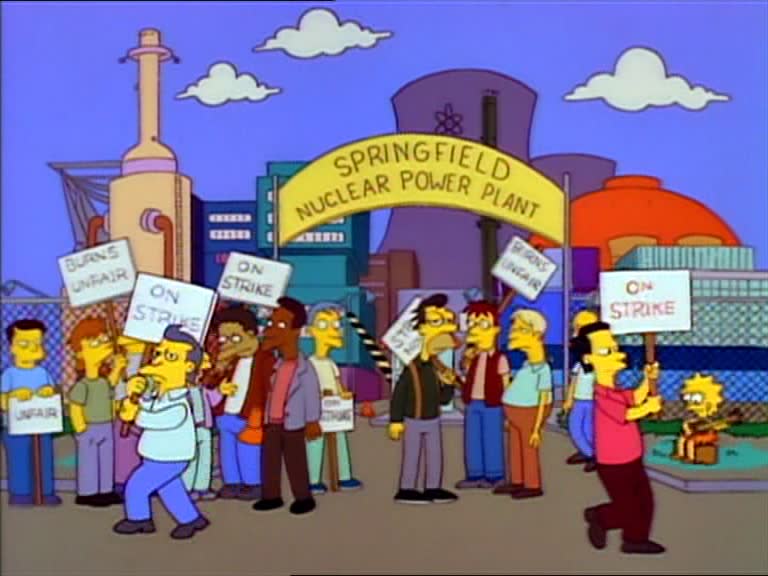
This was the episode where Mr Burns tries to take away the dental plan of the Springfield Nuclear Power Plant’s Trade Union, in exchange for a keg of beer at their meetings. When a visit to the dentist reveals that Lisa needs braces, it forces Homer to act. After being elected Union President, he leads a strike aimed at reclaiming the plan from Burns’ clutches.
Last Exit To Springfield stems from the show’s near-faultless fourth season, a period in which the show was firmly at its creative peak. The exact range of The Simpsons’ golden era can be debated to a degree, but you’d be hard pressed to argue against the fact that seasons 4-6 represent the show at its zenith. Great concepts, genuine character development, cutting satire and incisive comedy were still very much the order of the day and Last Exit to Springfield had it all in abundance.
On the surface, it’s the story of working men standing up for their rights and fighting against corporate greed. However there are also some subtle little digs at organized labour thrown in the mix as well, for example the proletariat firebrand in Mr Burns’ flashback who as he’s being bundled away decries:
“You can’t treat working men this way! One day we’ll form a union and get the fair and equitable treatment we deserve! Then we’ll go too far and get corrupt and shiftless and the Japanese will eat us alive!”:
Homer vs Burns

The episode is also a personal battle between Homer and Mr Burns. The plant owner and resident evildoer wrongly misreads Homer as some sort of master tactician, while Homer manages to misread Burns’ attempt at mediation as a sexual advance.
“Sorry, Mr. Burns, but I don’t go in for these backdoor shenanigans.”
While Burns is motivated by sheer greed and general malevolence, Homer is just trying to do right by his family. Lisa’s visit to the dentist is mined for great comedy, from his ‘Big Book of British Smiles’, to his scathing rebuke of Ralph Wiggum, “why must you turn my office into a house of lies?”
Lisa’s predicament also leads to the legendary moment that no doubt immediately sprang into your head as soon as the term “Dental Plan” was mentioned. The scene in question sees Homer’s inner-monologue wrestling with the complexities of what losing the dental plan means for his family, a concept which takes an alarming amount of time to sink in. The end result is a repeating mantra, seared into the minds of fans everywhere:
“Lisa needs braces.”
”Dental plan.”

The Homer of this era of The Simpsons was more of a lovable simpleton than the boorish and crude character he became. Far more kind-hearted and less mean-spirited than in later seasons. In season four, he just wants to do right by his family.
Mr Burns
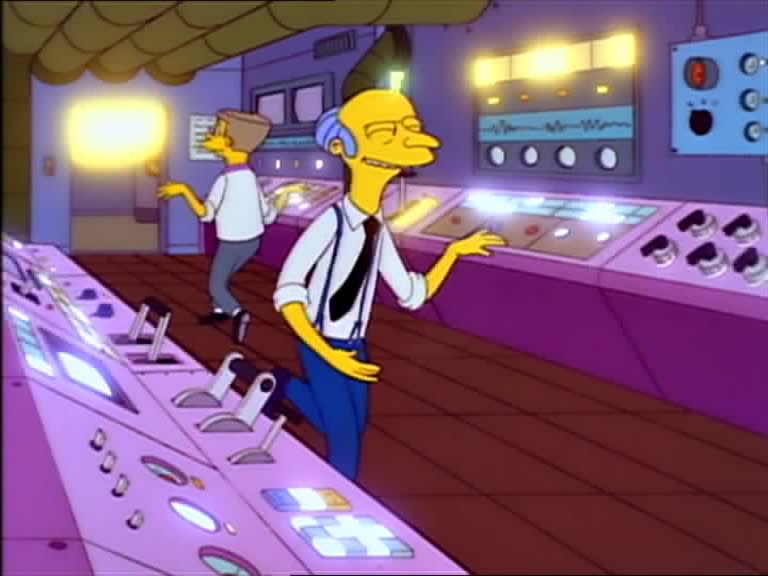
Mr Burns is at his very best in this episode. An absolutely grasping, evil, conniving ogre, who sees the rights of the working man as a mere obstacles to overcome. His whole motivation is basically just sticking it to the Union for no real reason other than to flex his muscle.
Once the strike does occur, we also get the great sequence of him and Smithers dancing their way giddily and care-free through the plant like some sort of 50s musical. Later on, he even cuts off the city’s entire power supply in an classically villainous attempt to shut down the strike. The Dr Seuss, How the Grinch Stole Christmas reference that is worked in as he stands atop his balcony listening to their protest songs is a wonderfully apt touch.
Pop-Culture References
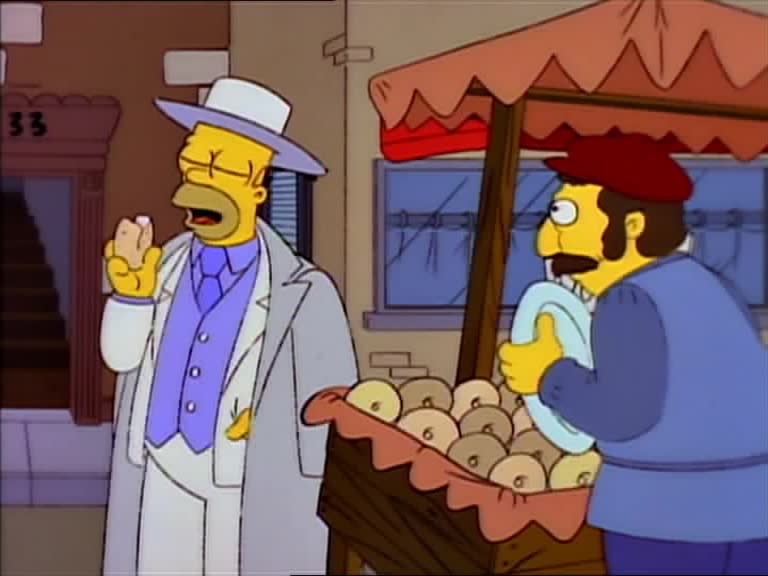
The Simpsons has always incorporated excellent movie references and there’s some absolute belters throughout this episode. Lisa’s psychedelic trip is a clever nod to Yellow Submarine, while there’s also a brilliant tribute to Don Fanucci in The Godfather Pt II where Homer envisions what it would be like if he made inroads into organised crime.
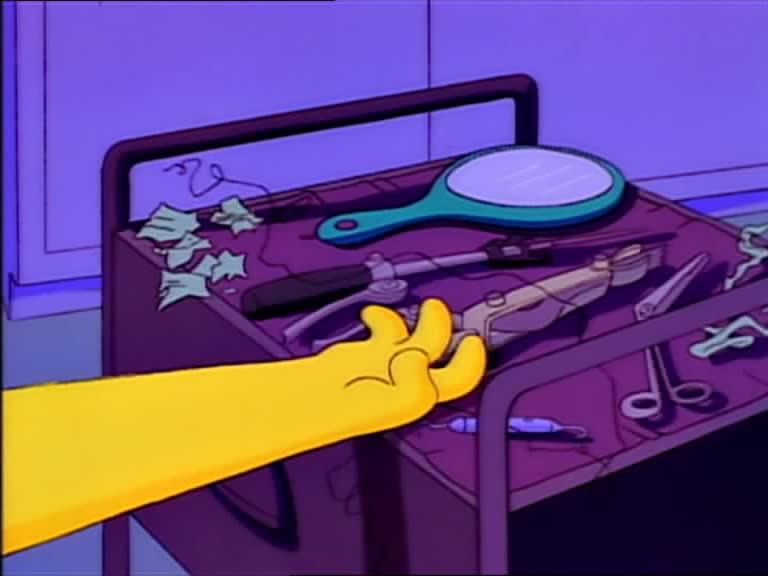
The crowning glory though is the nod to Jack Nicholson’s Joker in Batman where Lisa demands the dentist hands her a mirror so that she can see the result of his handiwork, before breaking out in a maniacal laugh when she glimpses the end result.
Classic Moments
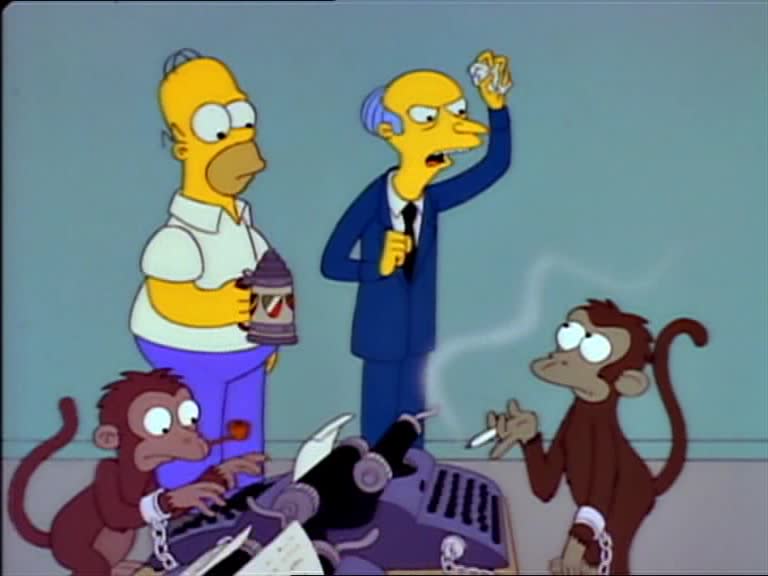
Last Exit To Springfield is one of those episodes where basically every scene is an iconic Simpsons moment. On top of those already mentioned we get Grandpa Simpson’s classic onion anecdote, Hired Goons, the enigma that is Gummy Joe plus a personal favorite of mine between Burns and Homer during their tour of Burns’ vast estate:
“Find the bathroom alright?
“Um…yeah…..”
There’s also arguably the greatest of all the McBain clips, in which the villainous Mendoza boasts about inventing ‘Swank’, which he states is “ten times more addictive than Marijuana.” Next thing we know, Rainier Wolfcastle is popping out of the ice sculpture and delivering the immortal line, “ice to see you.” A line which I’m still never sure whether it’s from McBain or Batman and Robin.

However the funniest moment in the entire episode, and indeed one of the show’s all-time great lines, comes in the bizarre sequence in which Mr Burns is trying to overwhelm Homer by using his opulent surroundings as a means to disorientate and befuddle his rival. This leads to him showing Homer a room filled with monkeys and typewriter:
“This is a thousand monkeys working at a thousand typewriters. Soon, they’ll have written the greatest novel known to mankind.”
(reads one of the typewriters)
“It was the best of times, it was the blurst of times”?! Stupid monkey!”
Like all the best episodes of The Simpsons, Last Exit To Springfield is smart, funny and heartfelt. In amongst the fun, it also manages to tug on the heartstrings thanks to its central theme of a father’s love winning out over corporate greed. It may be 25 years old, but in a quarter of a century it’s lost absolutely none of its charm.
Read More:
10 Mind-blowing Rick and Morty Easter Eggs you might have missed
11 times The Simpsons predicted the future with eerie precision
6 Netflix Originals to look forward to in 2018

 Yahoo Movies
Yahoo Movies 
